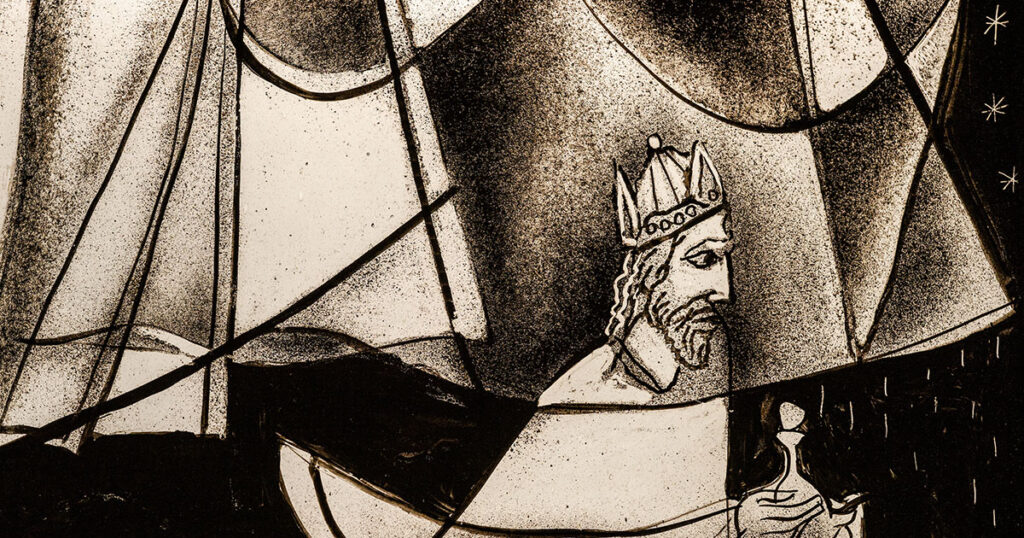The weighty hymn “The Star Proclaims the King Is Here” (LSB 399) is an ancient hymn excerpted from the same poem as our Christmas hymn: “From East to West, from Shore to Shore” (LSB 385). Written in the fifth century by the poet Sedulius, the poem is an acrostic. The initial word of each stanza begins with the successive letter of the alphabet, and from start to finish it runs through the life of the Word Made Flesh, our Lord Jesus. It’s rather like Psalm 119, for example, in the Hebrew. The stanzas from H (Hostis Herod) through N supply the selected verses from which this hymn was taken to be sung at Vespers in the Middle Ages for Epiphany and its successive season, and Luther translated it into German in the 1543 Klug Hymnal. (Read all about its history in Lutheran Service Book: Companion to the Hymns, 1:192–94.)
Let’s meditate upon the text of the hymn.
LSB 399:1
The star proclaims the King is here;
But, Herod, why this senseless fear?
For He who offers heav’nly birth
Seeks not the kingdoms of this earth.
The star. What was it? How did it proclaim to the Wise Men? Oh, scholars and the pious have wondered about that for years. I love St. John Chrysostom’s insight on this in his sermons on Matthew 2. He argues that we ought not look for the star in nature or to be explained by nature. It was clearly a divine grace, and though we’ll not know until all things are known how its light betokened to the Magi the birth of the promised King, it is enough to know that it did.
Sedulius marvels at how the word of the new King, who comes only bearing the gift of a heavenly birth, the rebirth of Holy Baptism, is such a threat to Herod. He was no threat to Herod’s throne, though Herod senselessly feared so. Truth is, Herod did have an enemy that was drawing ever nearer. It was that enemy of Herod — and of us all — that the Child was born to defeat: Death, which would soon rob Herod of his crown and his throne. But the King that the star proclaimed came to give a rebirth that delivers from sin and death and hell itself. Oh, how Herod needed what the Child came to give.
The eastern sages saw from far
LSB 399:2
And followed on His guiding star;
And, led by light, to light they trod
And by their gifts confessed their God.
The “eastern sages” — the wise men — are drawn by the light, and they follow where it leads. Matthew 2 does not suggest that they followed the star from their homeland, wherever that was in the east, but rather that as scholars devoted to studying the sky, they somehow realized what this new light meant and so they came. Maybe during the exile, the Israelites had shared the wisdom of their scrolls with the Gentiles among whom they lived. Numbers 24:17 speaks of “a star” that “shall come out of Jacob.” And Isaiah 60:1, 3 declares that “the glory of the Lord has risen upon you” and “nations shall come to your light, and kings to the brightness of your rising.” It is this Old Testament reading, I believe, that resulted in the notion of the Magi being “three kings.”
The supernatural light they saw in the sky that announced the birth of the King of the Jews to them, reappeared after Herod told them to search in Bethlehem. And their hearts rejoiced, and the light led them directly to the house where the mother and Christ Child were. Chrysostom does not think that this is a natural phenomenon because a normal star could not indicate a specific house. But this star does exactly that. This light leads these men (who might well have been worshippers of the heavenly lights) to the Light of light that has come down into human flesh. And yes, their gifts confess: gold for the King, incense for the King being God and myrrh for the King being Man, who will sacrifice His life for the life of all upon His cross and then be laid in the tomb to forgive sin and destroy death.
Within the Jordan’s sacred flood
LSB 399:3
The heav’nly Lamb in meekness stood
That He, of whom no sin was known,
Might cleanse His people from their own.
John the Baptist had, of course, called Him the Lamb of God who takes away the sin of the world. I suspect he learned that at the Baptism. You remember? Jesus shows up for the sinner’s Baptism, and John is not having any of it. “I need to be baptized by you, and do you come to me?” (Matt. 3:14) But Jesus insists that this is how they will fulfill all righteousness. He will step down into Jordan’s crystal stream as the One who has come to stand in solidarity with all sinners, to take our very sin upon Himself.
From the moment of His Baptism, Jesus was headed to His cross to be the completely sinless Lamb that would take away the sins of the world in His utter meekness. And so, He has joined His cross with the waters of Baptism and put into those waters all its saving power. He needed none of what happened in that miracle. We needed it all. Heaven had always been open to Him; He was always the beloved Son of the Father, and the Spirit proceeds from Him as from the Father.
But us? In Adam, heaven had slammed shut; we were no longer God’s beloved, but the objects of divine wrath; we were not filled with the Holy Spirit, but in league from our conception with the evil one. Jesus comes as the Lamb into the waters that day to manifest the astounding grace of God toward our race. When we deserved nothing, He came to give us everything: an open heaven, the gift of adoption as sons and the Holy Spirit. All ours when we get into the water with Jesus. Astounding gifts and as huge a manifestation as the star itself.
And oh, what miracle divine,
LSB 399:4
When water reddened into wine!
He spoke the word, and forth it flowed
In streams that nature ne’er bestowed.
We move from the Baptism to the wedding feast in Cana told in John 2. And again Jesus manifests His glory and His disciples believe in Him (John 2:11). The one leads to the other. From the waters of rebirth to the feast where He still speaks a word that gives a gift beyond the ability of nature.
Yes, I think Sedulius would have us keep the Eucharist in view here. Jesus to this day speaks a word that transforms this to that. He transformed water to wine at Cana; today through His Word, He manifests His glory in giving us His body and His blood. And this itself is a pledge and share of our entrance into and foretaste of the great marriage supper of the Lamb in His kingdom, which has no end. Jesus manifests His power over nature by His Word, transforming and giving what was ordinary as suddenly extraordinary; what was just bread or wine, He now gives as a gift that “nature ne’er bestowed”: forgiveness of sins, life and salvation. And that gift, as at Baptism, is solidly placed into earthly things with His Word and promise. This manifests Him to faith as true God, for it is only God who can say: “let there be” and have it follow that “there was.” He speaks and we fall before Him and confess it is surely as His divine majesty has declared. No matter how hidden from our eyes, His words accomplish what they promise.
For this His glad epiphany
LSB 399:5
All glory, Jesus, be to Thee,
Whom with the Father we adore,
And Holy Spirit evermore.
A glad epiphany. How could it not be? Remember the words of the Angel: “Good news of great joy that will be for all the people … a Savior” (Luke 2:10, 11). The angels were an epiphany, a shining forth to the shepherds. But the three-fold miracle of star, Baptism and Cana hold hands and dance a jig of joy before the blessed Trinity, who through them declares that He is among us to save — then and now. This is what loosed Sedulius’ tongue to praise, and the church with joy has taken up the ancient words in all the centuries since, extolling together our Jesus, His Father and His Spirit.
A blessed Epiphany, people loved by God. An epiphany of gladness that no sorrow or sighing of this age can ever dim.






RE: “From the moment of His Baptism, Jesus was headed to His cross….”
Wasn’t Jesus “headed His cross” even prior to his conception?
For he “did not count equality with God a thing to be grasped, but emptied himself, by taking the form of a servant, being born in the likeness of men” (Phil. 2:6-7 ESV).
Another thought and heart provoking article from Rev. William Weedon. I appreciate these studies and insights!